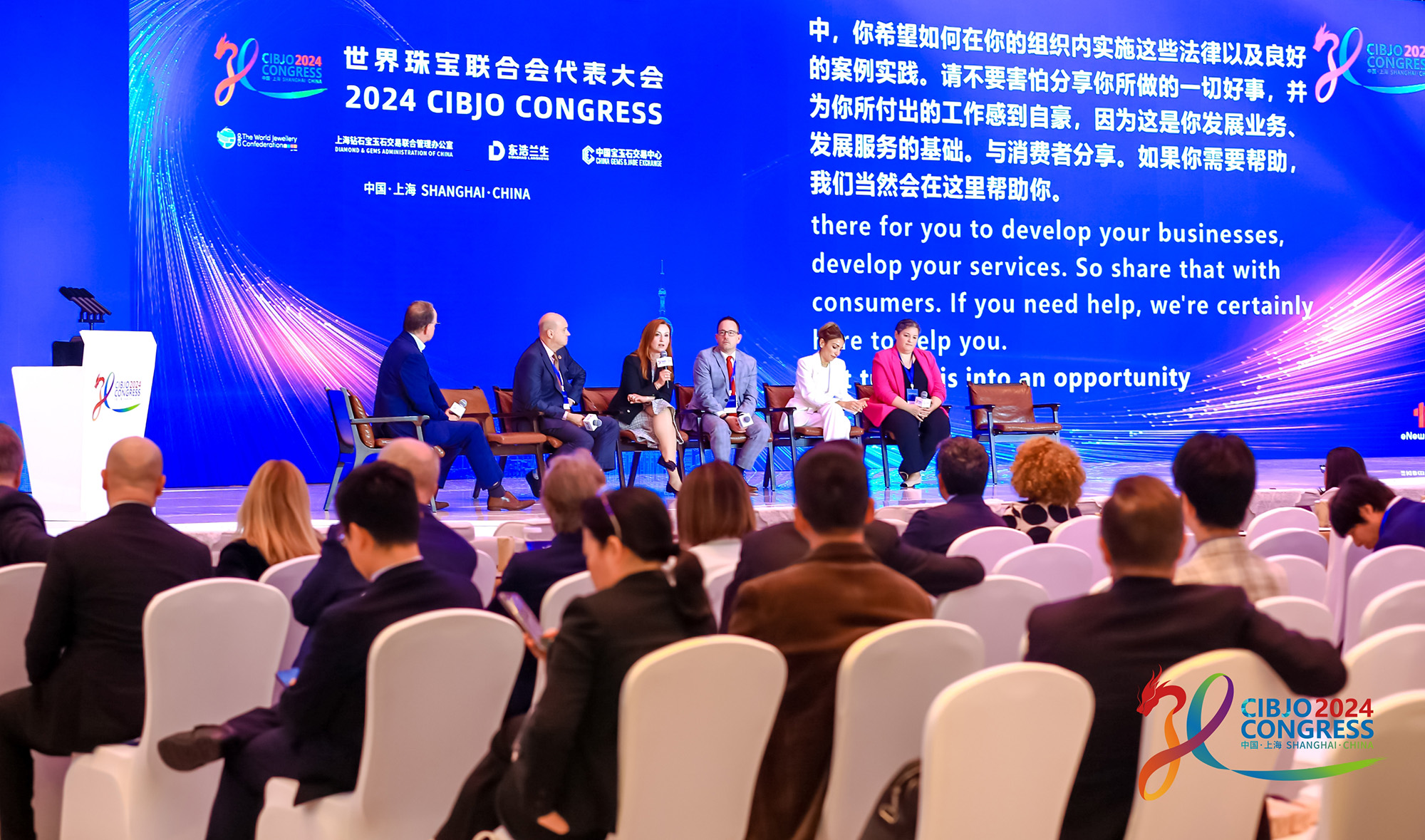Special panel at CIBJO Congress assesses impact
of geopolitics and government policies on jewellery industry

The Special Panel about how geopolitics and governments’ policies are impacting the jewellery industry in session at 2024 CIBJO Congress (from left): the moderator David Brough, Editor of Jewellery Outlook; Edward Johnson, Corporate Responsibility Director of Gemfields; Raluca Anghel, Global Head of External Affairs and Industry Relations at the Natural Diamond Council; Guido Grohmann, Managing Director of Bundesverband Schmuck, Uhren, Silberwaren und Verwandte Industrien e.V., Sara Yood, CEO and General Counsel at the Jewelers Vigilance Committee; Feriel Zerouki, President of the World Diamond Council and Senior Vice President of the De Beers Group; Sara Yood, CEO and General Counsel at the Jewelers Vigilance Committee and President of CIBJO’s Ethics Commission.
NOVEMBER 2, 2024
A special panel on the opening day of the CIBJO Congress in Shanghai looked at how geopolitics and government policies impact the jewellery industry, and considered how industry can participate in the formulation of such policies and respond to growing government oversight.
The panel was moderated by David Brough, Editor of Jewellery Outlook, and comprised industry leaders that included Feriel Zerouki, President of the World Diamond Council and Senior Vice President of the De Beers Group; Sara Yood, CEO and General Counsel at the Jewelers Vigilance Committee and President of CIBJO’s Ethics Commission; Raluca Anghel, Head of External Affairs and Industry Relations at the Natural Diamond Council (NDC); Edward Johnson, Corporate Responsibility Director of Gemfields, and Guido Grohmann, Managing Director of Bundesverband Schmuck, Uhren, Silberwaren und Verwandte Industrien e.V., Germany’s leading jewellery and watches trade association.
Mr. Brough began the conversation by emphasising that, while the topic under discussion was politics and government policy, CIBJO in principle does not express political opinions, although it is conscious that members of the industry are affected by geopolitical events, as well as statutes and regulations legislated by governments. CIBJO’s standard position is that all members of the industry abide by the letter of the law in the countries where they reside and operate.
“This discussion is not political. It is a look at the challenges faced by the jewellery industry from increased government oversight in recent years, and how to respond to those challenges,” Mr Brough said.
Mr. Grohmann and Mr. Brough addressed how events of geopolitical significance, such as the wars in Ukraine and the Middle East, as well as uncertainty over the outcome of the U.S. presidential election on November 5, as well as factors like falling U.S. interest rates, and central bank buying, had buoyed gold prices, which hit a series of all-time highs this year, and how jewellers had responded, for example by manufacturing more lightweight designs through technologies such as electroforming.
Ms. Zerouki outlined how the diamond industry had implemented the G7 Russian diamond import restrictions, which came into effect on March 1, 2024, and spoke of the challenges in implementation of the measures.
Ms. Anghel and Mr. Johnson discussed EU due diligence regulations bringing increased scrutiny of the supply chain in diamonds and coloured gemstones, not simply through recommendation but enforced by law, and Ms. Yood provided the U.S. legal perspective, which included new green guides being introduced by the Federal Trade Commission.
As the panel wrapped up, all the speakers gave their individual takeaways on how the jewellery industry can best respond to the challenges of increased government oversight.
Ms. Zerouki was of the opinion that legislative oversight could be counterproductive in that it tended to supress competition. Mr. Johnson held a different opinion, feeling the legislation set benchmarks that required companies to rise to the occasion.
